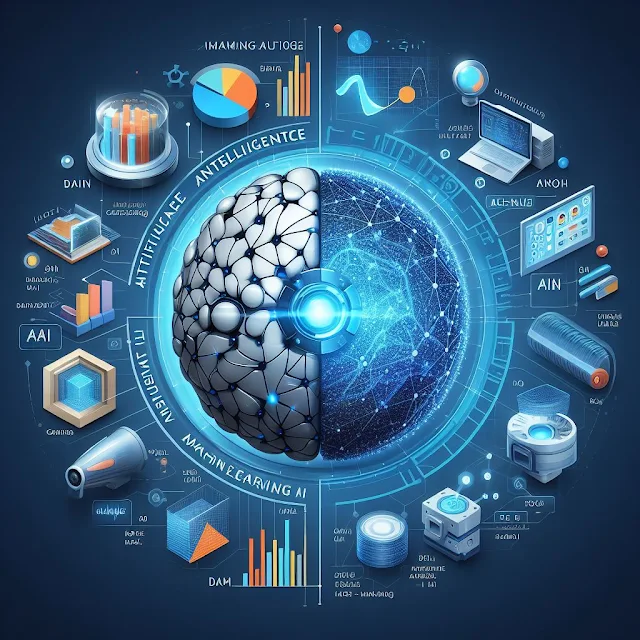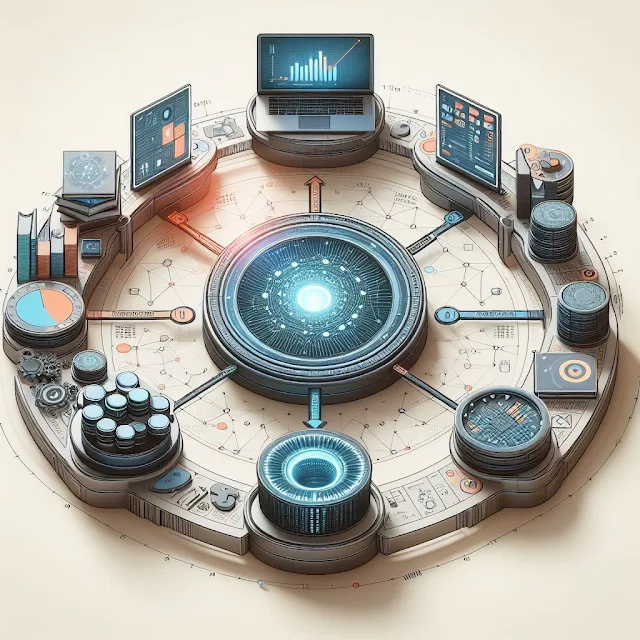Artificial Intelligence (AI) and Machine Learning (ML) are two interrelated fields that have gained significant attention in recent years due to their transformative potential across various industries. In this article, we will explore the fundamentals of AI and ML, their applications, and their impact on innovation, personalization, entertainment, and ethics.
Introduction to Artificial Intelligence and Machine Learning
At its core, AI refers to the simulation of human intelligence in machines that are programmed to think and act like humans. ML, on the other hand, is a subset of AI that focuses on the development of algorithms that enable computers to learn from and make predictions or decisions based on data. Both AI and ML have wide-ranging applications, from automating repetitive tasks to making complex decisions in real-time.
Understanding Artificial Intelligence
AI encompasses a broad spectrum of technologies and approaches aimed at creating intelligent machines that can perform tasks that typically require human intelligence. There are two main types of AI: Narrow AI, which is designed for a specific task or function, and General AI, which aims to replicate human-like intelligence across a wide range of tasks.
AI is already prevalent in our daily lives, often in ways that we may not even realize. For example, virtual assistants like Siri and Alexa use AI algorithms to understand and respond to natural language commands, while recommendation systems on streaming platforms use AI to suggest content based on user preferences.
What is Machine Learning?
Machine Learning is a subset of AI that focuses on enabling machines to learn from data without being explicitly programmed. This is achieved through the development of algorithms that can identify patterns and make predictions or decisions based on input data. There are several types of ML, including Supervised Learning, Unsupervised Learning, and Reinforcement Learning, each suited to different types of tasks and data.
One of the key advantages of ML is its ability to analyze large volumes of data and identify complex patterns that may not be apparent to humans. This has led to ML being used in a wide range of applications, from predicting customer behavior in marketing to diagnosing diseases in healthcare.
Key Concepts in AI and ML
Neural Networks and Deep Learning are two key concepts in AI and ML that have gained prominence in recent years. Neural networks are a set of algorithms modeled after the human brain that are designed to recognize patterns. Deep Learning is a specialized form of ML that uses neural networks with many layers (hence the term "deep") to learn from data.
Natural Language Processing (NLP) is another important area of AI that focuses on enabling machines to understand and interpret human language. NLP is used in applications such as language translation, chatbots, and sentiment analysis.
Computer Vision is the field of AI that focuses on enabling machines to interpret and understand visual information from the real world. This has applications in areas such as autonomous vehicles, facial recognition, and medical imaging.
AI and ML in Innovation
AI and ML have the potential to drive significant innovation across various industries by automating tasks, optimizing processes, and enabling new capabilities. For example, in the healthcare industry, AI is being used to analyze medical images, diagnose diseases, and personalize treatment plans based on individual patient data.
Personalization with AI and ML
One of the key benefits of AI and ML is their ability to personalize experiences for users. This can range from personalized product recommendations on e-commerce websites to customized news feeds on social media platforms. By analyzing user data and behavior, AI can create tailored experiences that are more engaging and relevant to individual users.
Entertainment and AI/ML
In the entertainment industry, AI and ML are being used to create more immersive and interactive experiences for users. For example, in gaming, AI algorithms can adapt gameplay in real-time based on the player's actions, creating a more dynamic and challenging experience. In content creation, ML algorithms can analyze vast amounts of data to identify trends and create content that is more likely to resonate with audiences.
Ethical Considerations in AI and ML
While AI and ML offer many benefits, they also raise ethical concerns, particularly around issues of bias, privacy, and accountability. Bias in AI algorithms can lead to unfair or discriminatory outcomes, while privacy concerns arise from the collection and use of large amounts of personal data. Additionally, as AI becomes more autonomous, questions of accountability and responsibility for decisions made by AI systems become more pressing.
Challenges and Future of AI and ML
Despite the rapid advancements in AI and ML, there are still many challenges to overcome. These include issues such as data quality and quantity, the interpretability of AI algorithms, and the ethical implications of AI technologies. However, with ongoing research and development, the future of AI and ML looks promising, with the potential to continue revolutionizing industries and improving the quality of life for people around the world.
Conclusion
In conclusion, Artificial Intelligence and Machine Learning are two fields that are poised to shape the future in profound ways. From revolutionizing industries to personalizing user experiences, the potential applications of AI and ML are vast. However, it is important to consider the ethical implications and challenges associated with these technologies to ensure that they are developed and used responsibly.
FAQs on Artificial Intelligence and Machine Learning
- What are some examples of AI in everyday life?
- AI is used in virtual assistants like Siri and Alexa, recommendation systems on streaming platforms, and fraud detection systems in banking.
- How does machine learning differ from traditional programming?
- In traditional programming, rules are explicitly defined by programmers, while in machine learning, algorithms learn from data to make predictions or decisions.
- What are the ethical concerns surrounding AI and ML?
- Ethical concerns include bias in algorithms, privacy issues related to data collection, and the potential impact on the job market.
- What role does AI play in the future of healthcare?
- AI has the potential to revolutionize healthcare by enabling personalized treatment plans, analyzing medical images, and predicting disease outbreaks.
- How is AI impacting the job market?
- AI is automating repetitive tasks but also creating new job opportunities in fields like data science and AI ethics

.jpeg)
.jpeg)
.jpeg)
.jpeg)
